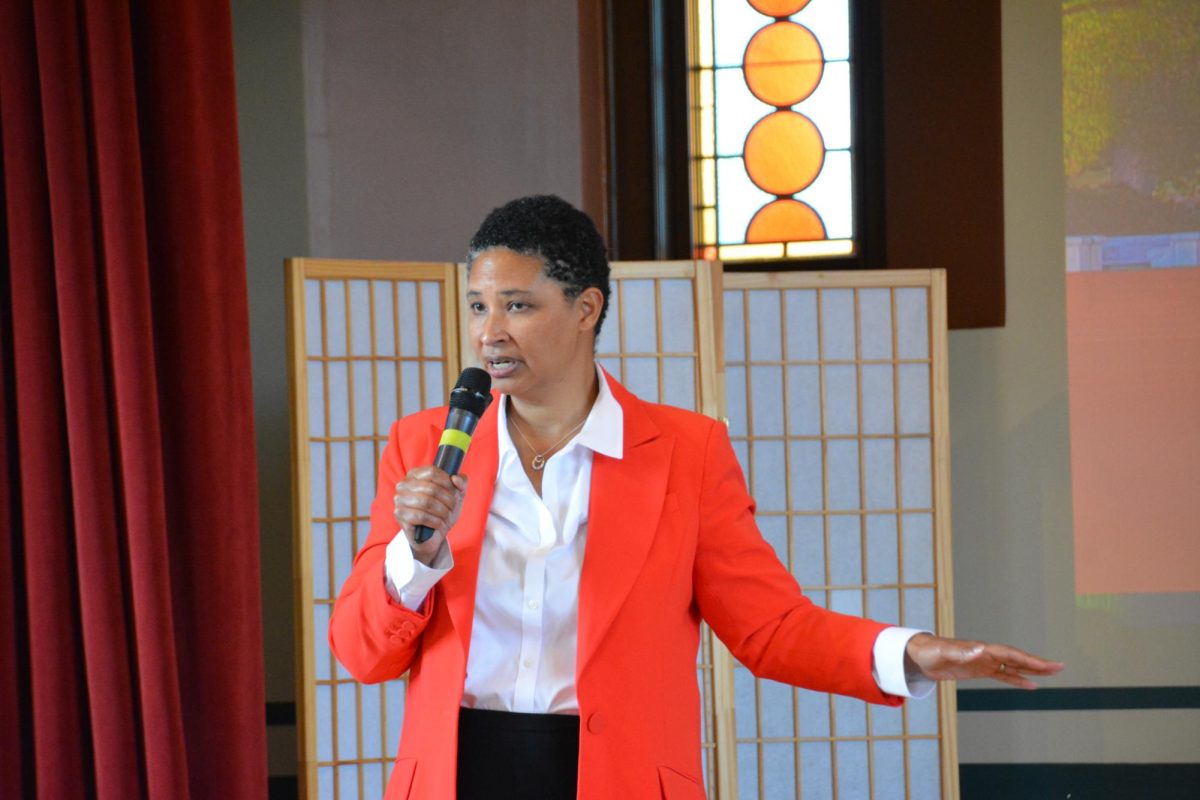
In the auditorium of Northampton High School, five panelists discussed the North Korea Nuclear Threat in relation to United States policy.
The panelists included Hampshire College professor Michael Klare, Chair of the Board of the Arms Control Association in Washington D.C. Tom Countryman, Smith College professor Dennis Yasutomo and Massachusetts Representative Jim McGovern, D-Ma 2nd District. Columnist at the Hampshire Gazette and founder of the new pop-up Sojourner Truth School Reverend Andrea Ayvazian moderated the panel.
The panel discussion kicked off after Elizabeth Silver, chair of the Northampton Democratic City Committee, gave a short introduction.
“It’s been just over a year since the election and the world has turned into a more dangerous place since then,” said Silver. “I hope that everybody, including myself, will get a better understanding of issues in the region, the complexity of what’s happening, what’s being done to help and what we can do to help avert any further escalations.”
Ayvazian gave background information on the United States’ current military positions on North Korea, explaining that the panel would help explain the “enormity of the situation.”
In a pre-recorded video, Representative Jim McGovern reported from Washington D.C. that
he is trying to “introduce bipartisan bicameral legislature…because war is war is war.” In a letter to President Donald Trump earlier this year, McGovern emphasized “diplomacy, economic pressure and crisis management.”
“Some might argue that prohibiting making the first nuclear strike inhibits the president and ties his hands behind his back, but we have seen the destructive capacity of our weapons in Afghanistan and Iraq,” said McGovern.
McGovern concluded by suggesting that a broad group of people need to come forward and have a discussion in this country and that the United Nations needs to completely abolish nuclear weapons to make Congress reign in the president.
After the video, Klare began the discussion by providing additional context to the conversation.
“The nature of the threat we face is two-fold. The first part comes from North Korea, and that threat is that North Korea, we believe, is on the verge of acquiring an intercontinental ballistic missile (ICBM) with a nuclear warhead to launch that on U.S. territory,” Klare said.
Klare explained that the second part is the U.S. government failing to act diplomatically.
“North Korea wouldn’t be threatening the U.S., if its leaders, [the] Kim family, did not perceive a politically strategic purpose for doing so,” said Klare.
Yasutomo acknowledged early on that “in truth, I don’t really know the answer.” He said that he hopes to educate people on what is going on with North Korea’s neighbors, such as China and South Korea. Yasutomo concluded that the United States’ relationships with South Korea and Japan are worsening while South Korea’s and Japan’s relationships with China are improving.
“Trump relegates Japan to a subordinate position economically and makes fun of their ability to defend themselves,” Yasutomo said of Trump’s meeting with Japanese Prime Minister Shinzo Abe.
“The thing to remember is that China has come up with a global vision for its role in the world…it’s created new multilateral institutions in Asia…It’s not hard to think China finds it bothersome to deal with a bad neighbor such as North Korea,” Yasutomo said.
Yasutomo also acknowledged the University of Massachusetts, saying, “I hope they [UMass students] follow what’s going on in the news, because this is international news that has serious local implications depending on what happens.”
Countryman took over the discussion with a list of the three arms control issues prevalent to the world right now: the U.S.’s relationship with Russia, the North Korea crisis and Iran.
Countryman said that there are estimates that North Korea has somewhere between 20 to 60 warheads. In order to preserve its regime, North Korea is depending on nuclear weapons to make other countries view it as a threat. Countryman argues in the favor of diplomacy.
“I’ve seen enough situations where diplomacy has prevented enough situations where military action would have cost American soldiers’ lives,” Countryman said.
Countryman believes that the President’s readiness to abandon every agreement his predecessor has signed diminishes the credibility of the United States. “It diminishes the U.S. in the eyes of the rest of the world, including our allies,” he said.
Overall, the panel encouraged self-education for the audience members and believed that the answer to the North Korean problem does not align with the Trump administration’s plans.
Sarah Cho, a UMass doctoral student in the communication department, believes that negotiations with the North Korean dictatorship won’t happen under current circumstances. Cho brought in her perspective as someone who had moved from South Korea just five years ago. She described how the North Korean threats have affected her directly.
“They [the Kim family] are crazy. There is no doubt that they are doing crazy things to the world and they are draining the peace of the world. It’s really obvious,” Cho said. She is concerned for her family in South Korea.
“We [South Koreans] all know it’s not about ideology or power anymore, it’s all about money and economy now. The U.S. is the richest country in the world, and North Korea is the poorest one. These days President Trump is spreading all of the threatening speeches, [and] because of his language, South Koreans feel more threatened now than they did before,” Cho said.
Within the panel discussion, it was understood that the North Korean crisis is complicated, but according to Cho and the panelists, there are two viable solutions: Leave North Korea alone or have diplomatic relations. The one thing every panelist agreed on was that Trump’s rhetoric, threats and insults toward the North Korean regime are harmful and dangerous to the people of South Korea because they only exacerbate the situation.
Miranda Emily Eden Senft can be reached at [email protected].



















Ed Cutting, Ed. D. • Nov 17, 2017 at 11:34 am
EMP is far more terrifying than just the power grid — it would take out anything with unshielded electronics, including every gasoline engine made after about 1976 and every Diesel made after 2007. That includes emergency generators.
There’s be no water and no sewer — cities would be unlivable. We only have a 5 day supply of food in our stores — no trucks means no restocking. — people would starve.
Estimates are 50% to 90% of Americans would be dead within 12 months.
This is real, and the DKPR could do it…
NITZAKHON • Nov 16, 2017 at 9:42 am
“Leave North Korea alone”. And what if they decide to not leave US alone.
ONE Nork nuke on a missile, detonated high above the US, would destroy our electric grid for months if not years. And they know it.
EMP: A Terrorist’s Dream
https://www.youtube.com/watch?v=MFZo5PqvEak